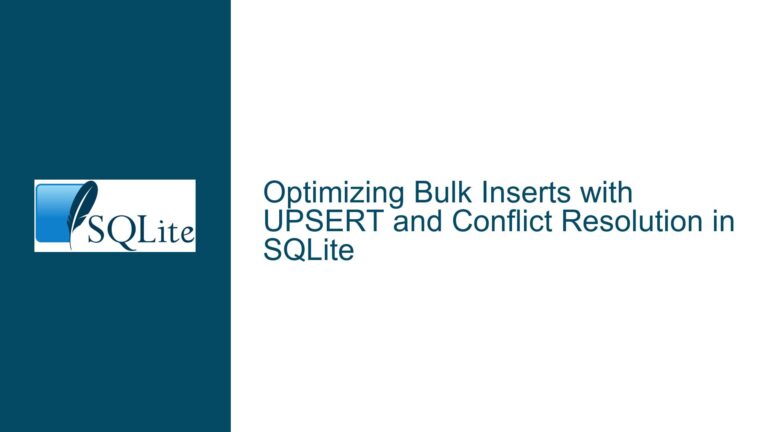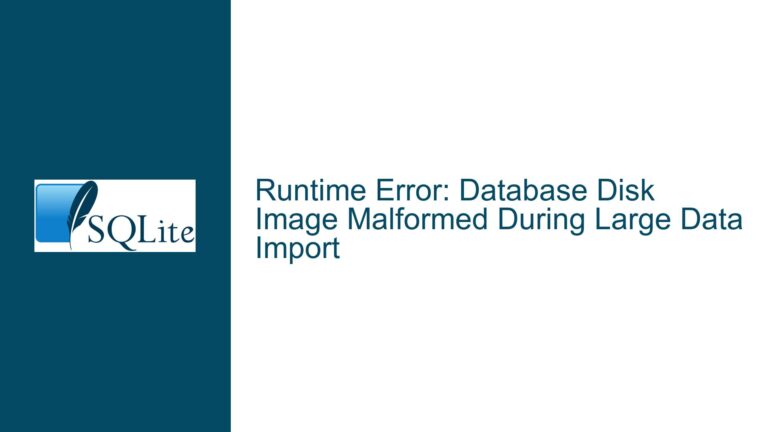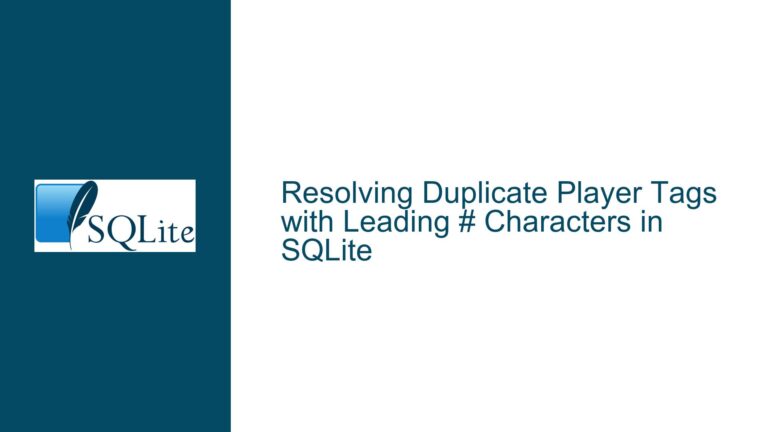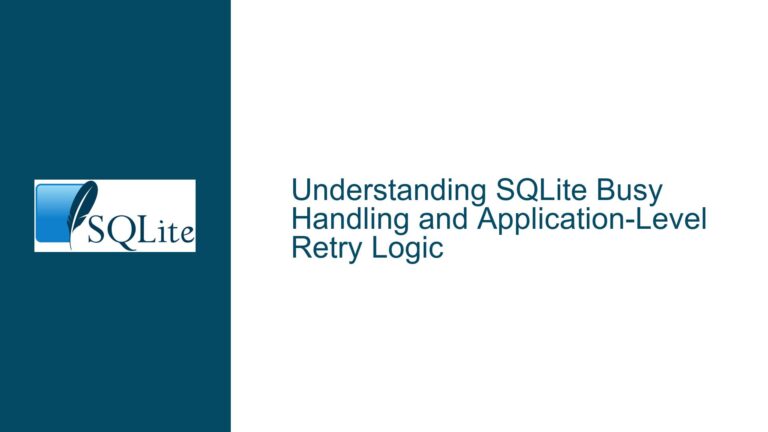Binding Dynamic Date Offsets in SQLite Queries via C++/Qt Applications
Issue Overview: Constructing Parameterized SQLite Date Queries with Variable Offsets in C++/Qt
The core challenge involves programmatically generating SQLite BETWEEN clauses with dynamic date offsets in C++ applications using Qt frameworks. Developers need to query date ranges relative to the current time (e.g., "last 300 days") by replacing hardcoded numerical offsets (-300, -280) with integer variables. A working SQL syntax for static values exists:
SELECT SUM(1Data), SUM(2Data), SUM(3Data), SUM(4Data), SUM(5Data)
FROM dbTable
WHERE timeDayData BETWEEN date('now', '-300 day') AND date('now', '-280 day');
The goal is to parameterize -300 and -280 as variables (e.g., int date1 = -300; int date2 = -280;) while preserving SQLite’s date modifier syntax. Attempts to use parameter binding via ?1, ?2, :var1, or :var2 in Qt’s SQLite driver fail due to syntax errors or driver limitations. Direct string interpolation using std::snprintf or Qt’s string formatting raises concerns about SQL injection risks and query optimization.
Key technical constraints include:
- SQLite Date Modifier Syntax: The
date()function requires modifiers like'-300 day'to be string literals, not numeric placeholders. - Parameter Binding Limitations: SQLite’s C API and Qt’s QSqlQuery support parameter substitution for values (e.g.,
WHERE id = ?), but not for syntax components like date modifier offsets. - String Concatenation in SQL: Building the modifier dynamically (e.g.,
CAST(?1 AS TEXT) || ' days') requires precise syntax to avoid parser errors.
Possible Causes: Why Dynamic Date Offsets Fail in Qt/SQLite Bindings
1. Incorrect Concatenation Operator in SQL
SQLite uses || for string concatenation. Substituting with | (bitwise OR) or omitting the operator entirely results in syntax errors:
-- Wrong: Missing concatenation operator
date('now', CAST(?1 AS TEXT) ' days')
-- Wrong: Using bitwise OR
date('now', CAST(?1 AS TEXT) | ' days')
-- Correct: Using ||
date('now', CAST(?1 AS TEXT) || ' days')
Qt’s query parser does not validate SQL syntax; errors propagate to runtime, causing silent failures or incomplete query execution.
2. Type Mismatch in Parameter Binding
When binding integer variables (e.g., -300) to parameters in CAST(?1 AS TEXT), implicit type conversion may fail if the binding API expects a string. For example, Qt’s QSqlQuery::bindValue() infers types based on the variable’s C++ type. Binding an integer to a parameter expecting a text value (due to CAST) can lead to incorrect SQL:
int date1 = -300;
query.prepare("... CAST(?1 AS TEXT) || ' days' ...");
query.bindValue(0, date1); // Binds as integer, not text
This generates CAST(-300 AS TEXT) instead of CAST('-300' AS TEXT), which technically works but may conflict with driver-specific behaviors.
3. Qt SQLite Driver’s Placeholder Support
Qt’s SQLite driver has nuanced support for parameter styles:
- ODBC-style (
?): Positional parameters, order-sensitive. - Oracle-style (
:var): Named parameters, requiresQSqlQuery::bindValue(":var", value).
Mixing styles (e.g., using ?1 instead of ?) or omitting the colon in named parameters (var1 vs. :var1) causes binding failures.
4. Prepared Statement Caching Issues
When reusing a QSqlQuery object without calling clear() or finish(), residual bind values or incomplete result sets may corrupt subsequent executions.
5. SQLite Function Parsing Ambiguities
The date() function’s second argument expects a modifier string. If the concatenated value (e.g., CAST(?1 AS TEXT) || ' days') evaluates to an invalid format, SQLite silently treats it as NULL, leading to incorrect date calculations.
Troubleshooting Steps, Solutions & Fixes: Robust Parameterization Strategies
Step 1: Validate SQL Syntax in Isolation
Before integrating into C++/Qt, test the query in the SQLite Command-Line Interface (CLI) to isolate driver-specific issues.
Example:
-- Static test
SELECT date('now', '-300 day'); -- Valid
-- Parameterized test (CLI does not support binding, simulate with ||)
SELECT date('now', CAST(-300 AS TEXT) || ' day'); -- Valid
SELECT date('now', CAST(:var1 AS TEXT) || ' day'); -- CLI ignores :var1; use .param set
.param set @var1 -300
SELECT date('now', CAST(@var1 AS TEXT) || ' day');
If these work, the issue lies in the Qt binding logic.
Step 2: Correct Parameter Binding in Qt
Use named parameters with explicit string conversion in C++:
int date1 = -300;
int date2 = -280;
QSqlQuery query;
query.prepare(
"SELECT SUM(1Data), SUM(2Data), SUM(3Data), SUM(4Data), SUM(5Data) "
"FROM dbTable "
"WHERE timeDayData BETWEEN "
"date('now', CAST(:date1 AS TEXT) || ' day') AND "
"date('now', CAST(:date2 AS TEXT) || ' day')"
);
query.bindValue(":date1", QString::number(date1)); // Convert int to QString
query.bindValue(":date2", QString::number(date2));
if (!query.exec()) {
qDebug() << "Query failed:" << query.lastError().text();
}
Critical Notes:
- Explicit String Conversion: Binding
date1asQStringensuresCASTreceives a text value, avoiding integer-to-text ambiguities. - Concatenation Operator:
||must be present and unescaped.
Step 3: Debug Parameter Substitution
Enable Qt’s SQL debugging to inspect the final query:
QLoggingCategory::setFilterRules("qt.sql.*=true");
Check the logs for the actual query sent to SQLite. If the concatenation is missing or parameters are unbound, adjust the placeholder syntax.
Step 4: Fallback to String Formatting (With Caution)
If parameter binding remains problematic, use Qt’s string formatting with arg(), ensuring values are sanitized:
int date1 = -300;
int date2 = -280;
QString queryStr = QString(
"SELECT SUM(1Data), SUM(2Data), SUM(3Data), SUM(4Data), SUM(5Data) "
"FROM dbTable "
"WHERE timeDayData BETWEEN "
"date('now', '%1 day') AND date('now', '%2 day')"
).arg(QString::number(date1), QString::number(date2));
QSqlQuery query;
if (!query.exec(queryStr)) {
qDebug() << "Query failed:" << query.lastError().text();
}
Risks:
- SQL Injection: If
date1/date2derive from user input, sanitize or validate them as integers. - Performance: Repeated calls require re-parsing the query; use only for ad-hoc executions.
Step 5: Leverage SQLite’s C API Directly
Bypass Qt’s driver and use SQLite’s C API for finer control:
sqlite3* db;
sqlite3_open("database.db", &db);
int date1 = -300;
int date2 = -280;
const char* sql =
"SELECT SUM(1Data), SUM(2Data), SUM(3Data), SUM(4Data), SUM(5Data) "
"FROM dbTable "
"WHERE timeDayData BETWEEN "
"date('now', CAST(?1 AS TEXT) || ' day') AND "
"date('now', CAST(?2 AS TEXT) || ' day')";
sqlite3_stmt* stmt;
if (sqlite3_prepare_v2(db, sql, -1, &stmt, nullptr) != SQLITE_OK) {
qDebug() << "Prepare error:" << sqlite3_errmsg(db);
return;
}
sqlite3_bind_int(stmt, 1, date1);
sqlite3_bind_int(stmt, 2, date2);
while (sqlite3_step(stmt) == SQLITE_ROW) {
// Process results
}
sqlite3_finalize(stmt);
sqlite3_close(db);
Advantages:
- Avoids Qt driver quirks.
- Direct access to SQLite’s error codes and messages.
Step 6: Validate Date Modifier Output
Log the generated date modifiers to ensure they resolve to valid SQLite dates:
QDebug debug = qDebug();
debug.noquote() << "Generated modifier 1:" << QString("'%1 day'").arg(date1);
debug.noquote() << "Generated modifier 2:" << QString("'%1 day'").arg(date2);
Compare these against SQLite’s expected format (e.g., '-300 day').
Step 7: Handle Negative Offsets Correctly
Negative offsets calculate dates in the past. Ensure variables are negative integers. If using positive values, adjust the SQL:
date('now', '-' || CAST(?1 AS TEXT) || ' day')
Final Solution: Hybrid Approach for Qt Applications
Combine Qt’s parameter binding with explicit string conversion and SQLite’s concatenation:
QSqlQuery query;
query.prepare(
"SELECT SUM(1Data) AS sum1, SUM(2Data) AS sum2 "
"FROM dbTable "
"WHERE timeDayData BETWEEN "
"date('now', :offset1 || ' day') AND date('now', :offset2 || ' day')"
);
query.bindValue(":offset1", QString::number(-300)); // "-300"
query.bindValue(":offset2", QString::number(-280)); // "-280"
if (!query.exec()) {
qDebug() << "Error:" << query.lastError().text();
} else {
while (query.next()) {
double sum1 = query.value("sum1").toDouble();
// Process results
}
}
Key Improvements:
- Eliminates
CASTby pre-converting integers to strings in C++. - Uses named parameters (
:offset1) for clarity. - Concatenates in SQL with
||, ensuring valid modifier syntax.
By systematically addressing syntax errors, parameter binding nuances, and SQLite’s date function requirements, developers can robustly integrate dynamic date offsets into Qt-based applications.






